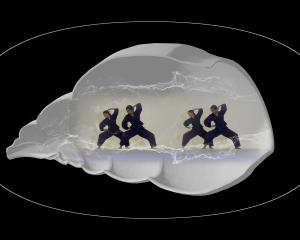Arthur and Jane: long-married, in tune with each other’s oddities, comfortable.
The trouble starts when Arthur’s memory starts to go, and there’s a long, slow progression from the day he forgets why he’s gone to the dairy, to his incomprehension, most of the time, of what’s going on around him.
It’s tough for both of them. Tough for Arthur because of his frustration at not being able to do things he once did, and not understanding why Jane doesn’t always share his perceptions of the world around him. Tough for Jane because of the distress of watching her much-loved husband turning into a different person, the unceasing demands of day-to-day coping and the overwhelming sadness of it all.
Contrast is provided by flashbacks to the couple’s younger days and shows days of easy flirtation to a Frank Sinatra soundtrack, lighting changes indicating the shifts between scenes.
Plays about Alzheimer’s aren’t uncommon: the one most familiar to Dunedin audiences may be The Keys are in the Margarine, verbatim theatre in which the actual words of Alzheimer’s carers are conveyed to the audience by actors. In Other Words, by UK playwright Matthew Seager, is more conventional, but has a similar impact.
Arthur and Jane are ordinary, recognisable and likeable, and experienced actors Michael Hurst and Jennifer Ward-Lealand play them to perfection, forcefully conveying Arthur’s painful confusion and Jane’s exhaustion and despair, sometimes addressing the audience directly. Inevitably, the play has an educational function, but mostly it is a testament to love which in the past has been able to overcome almost anything, but now is severely tested by this cruelly debilitating disease.
There was a full house at the Mayfair on Thursday night for the first of two Dunedin performances. Inevitably, many members of the (above median age) audience would have some kind of personal experience of Alzheimer’s, and some appeared visibly moved. Applause was prolonged and appreciative.
Review bt Barbara Frame











